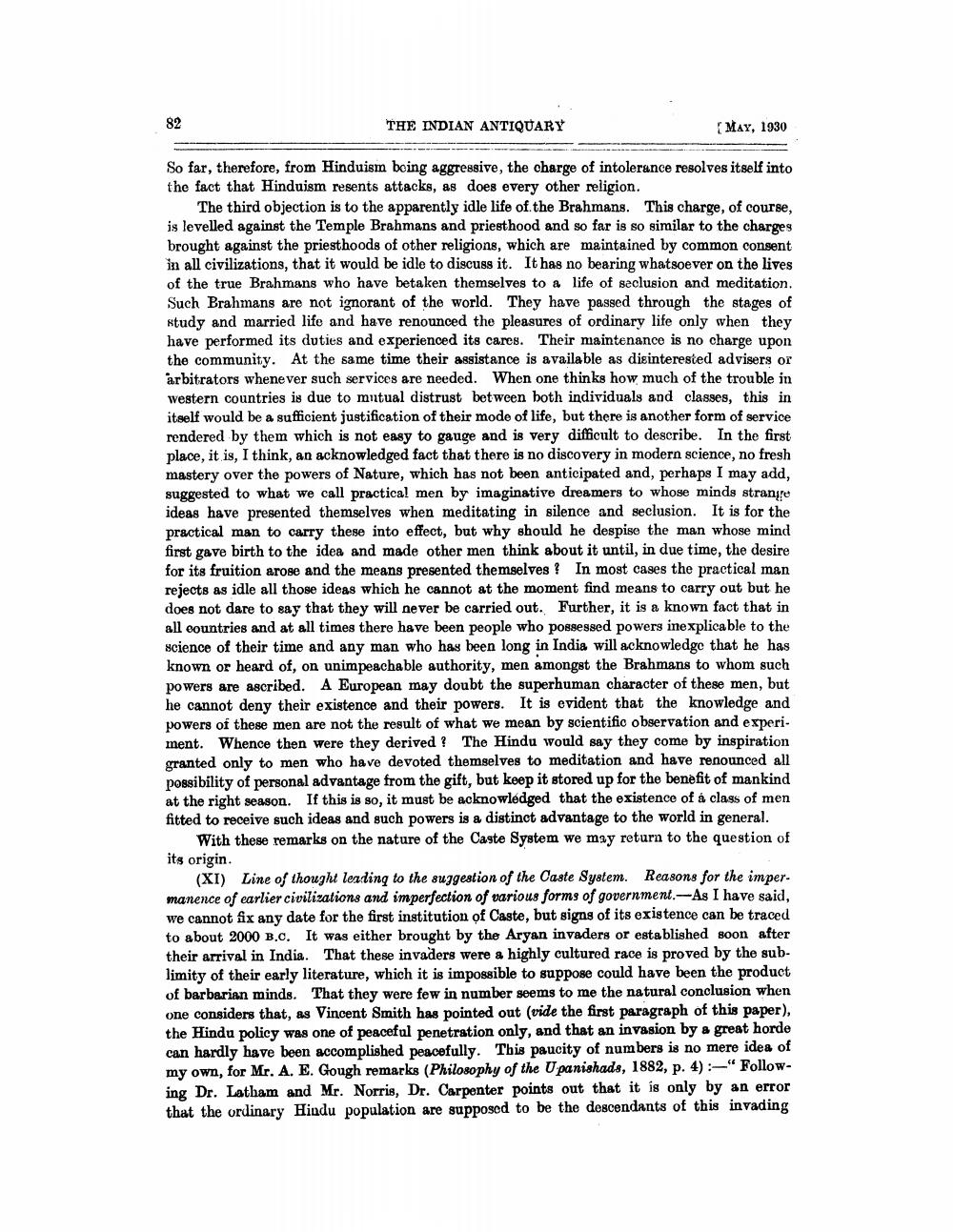________________
82
THE INDIAN ANTIQUARY
(May, 1930
So far, therefore, from Hinduism being aggressive, the charge of intolerance resolves itself into the fact that Hinduism resents attacks, as does every other religion.
The third objection is to the apparently idle life of the Brahmans. This charge, of course, is levelled against the Temple Brahmans and priesthood and so far is so similar to the charges brought against the priesthoods of other religions, which are maintained by common consent in all civilizations, that it would be idle to discuss it. It has no bearing whatsoever on the lives of the true Brahmans who have betaken themselves to a life of seclusion and meditation. Such Brahmans are not ignorant of the world. They have passed through the stages of study and married life and have renounced the pleasures of ordinary life only when they have performed its duties and experienced its cares. Their maintenance is no charge upon the community. At the same time their assistance is available as disinterested advisers or arbitrators whenever such services are needed. When one thinks how much of the trouble in western countries is due to mutual distrust between both individuals and classes, this in itself would be a sufficient justification of their mode of life, but there is another form of service rendered by them which is not easy to gauge and is very difficult to describe. In the first place, it is, I think, an acknowledged fact that there is no discovery in modern science, no fresh mastery over the powers of Nature, which has not been anticipated and, perhaps I may add, suggested to what we call practical men by imaginative dreamers to whose minds strange ideas have presented themselves when meditating in silence and seclusion. It is for the practical man to carry these into effect, but why should he despise the man whose mind first gave birth to the idea and made other men think about it until, in due time, the desire for its fruition arose and the means presented themselves? In most cases the practical man rejects as idle all those ideas which he cannot at the moment find means to carry out but he does not dare to say that they will never be carried out. Further, it is a known fact that in all countries and at all times there have been people who possessed powers inexplicable to the science of their time and any man who has been long in India will acknowledge that he has known or heard of, on unimpeachable authority, men amongst the Brahmans to whom such powers are ascribed. A European may doubt the superhuman character of these men, but he cannot deny their existence and their powers. It is evident that the knowledge and powers of these men are not the result of what we mean by scientific observation and experiment. Whence then were they derived ? The Hindu would say they come by inspiration granted only to men who have devoted themselves to meditation and have renounced all possibility of personal advantage from the gift, but keep it stored up for the benefit of mankind at the right season. If this is so, it must be acknowledged that the existence of a class of men fitted to receive such ideas and such powers is a distinct advantage to the world in general.
With these remarks on the nature of the Caste System we may return to the question of its origin.
(XI) Line of thought leading to the suggestion of the Caste System. Reasons for the imper. manence of earlier civilizations and imperfection of various forms of government.--As I have said, we cannot fix any date for the first institution of Caste, but signs of its existence can be traced to about 2000 B.C. It was either brought by the Aryan invaders or established soon after their arrival in India. That these invaders were a highly cultured race is proved by the sublimity of their early literature, which it is impossible to suppose could have been the product of barbarian minds. That they were few in number seems to me the natural conclusion when one considers that, as Vincent Smith has pointed out (vide the first paragraph of this paper), the Hindu policy was one of peaceful penetration only, and that an invasion by a great horde can hardly have been accomplished peacefully. This paucity of numbers is no mere idea of my own, for Mr. A. E. Gough remarks (Philosophy of the Upanishads, 1882, p. 4) :-"Following Dr. Latham and Mr. Norris, Dr. Carpenter points out that it is only by an error that the ordinary Hindu population are supposed to be the descendants of this invading




